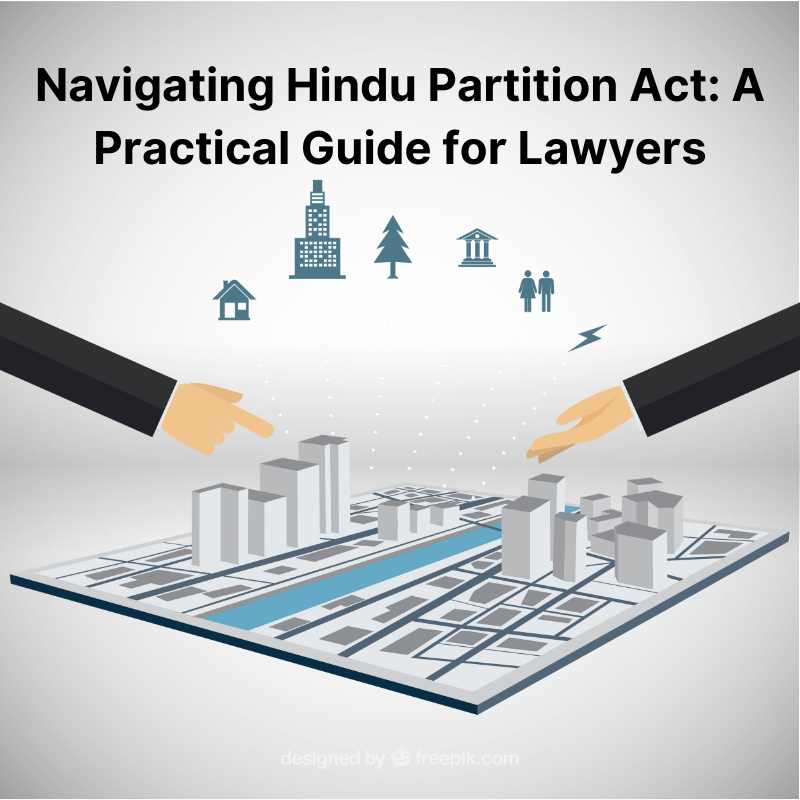
- December 16, 2024
- Kalluri Lakshmi Narasimha Rao
- civil courtscivil lawcivil procedure codecpcfamily courtfamily lawHindu LawHindu Partition ActHindu Succession ActInheritance LawJoint Family PropertyLegal Practice ManagementLegal ResearchProperty Divisionsessions courtTPATransfer of Property Act
Navigating Hindu Partition Act: A Practical Guide for Lawyers
Introduction: The Complexity of Hindu Partition and Property Laws
Partition of property among Hindu families is governed by a labyrinth of intricacies under Hindu law, including the Hindu Succession Act, Hindu Partition Act, and Transfer of Property Act (TPA). In the Indian context, family disputes regarding property are common, often leading to contentious litigation.
This blog delves into a specific case study involving a Hindu father’s property division among his children from two marriages. We’ll explore how the Hindu Partition Act and TPA apply and actionable tips for advocates defending the younger son’s rights to ensure justice.
Finally, we’ll show how Handyy Law Practice Management Software can aid advocates in handling similar property disputes more efficiently and effectively.
Case Study Overview: The Property Dispute
Family Background
- Father’s Earnings: ₹300 Crores in movable and immovable assets.
- Family Composition:
- First Wife (Deceased): Two children – Elder Son and Daughter.
- Second Wife (Alive): One child – Younger Son.
- Division of Property: The father partitions his property among the elder son and daughter, leaving the younger son without any share.
Legal Dispute
The younger son approaches the court to claim his share of the property. Advocates defending the younger son must apply laws under the Hindu Succession Act, Hindu Partition Act, and TPA to secure justice.
Actionable Tips for Advocates Defending the Younger Son
1. Establish the Younger Son’s Right to the Property
- Key Argument:
Under Section 8 of the Hindu Succession Act, self-acquired property of a Hindu male devolves upon his legal heirs. The younger son, being a legitimate heir, cannot be excluded. - Case Law Support:
Refer to landmark judgments like Vineeta Sharma v. Rakesh Sharma (2020), which affirm equal rights for all heirs.
2. Highlight Discrimination in Partition
- Key Argument:
Unequal treatment among heirs can be challenged as per the Hindu Partition Act. Advocate that the younger son has been discriminated against and denied his rightful share.
3. Leverage the Transfer of Property Act (TPA)
- Key Argument:
If the father has transferred properties exclusively to the children of the first wife, the advocate can investigate whether proper procedures under the TPA were followed. Transfers that are unjust or fraudulent can be challenged under Sections 53 and 54 of the TPA.
4. Prove Family Settlement Agreement Validity (if applicable)
- If the father claims the division was part of a family settlement, scrutinize the validity of the agreement. Courts require family settlements to be fair, free from coercion, and agreed upon by all parties.
5. Build an Emotional and Practical Appeal
- Argue the younger son’s dependence on the father and his equal rights to inheritance. Highlight the undue financial burden and mental distress caused by the father’s exclusion.
Step-by-Step Approach to Handle the Case
- Document Collection: Gather property deeds, family tree, evidence of partition, and communications.
- Legal Research: Use precedent cases and sections from the Hindu Succession Act, Hindu Partition Act, and TPA.
- Draft the Pleadings: File a suit with clear claims about the illegality of the partition.
- Court Proceedings: Present arguments based on discrimination and procedural lapses under the TPA.
- Settlement Option: Negotiate an amicable settlement for the younger son, if feasible.
How Handyy Law Practice Management Software Helps Advocates
1. Case Management Simplified
- Store, organize, and access case details securely using Handyy’s case management tools. For this dispute, advocates can categorize documents like property deeds, court orders, and family agreements.
2. Legal Research Made Easy
- Use Handyy’s citation library powered by integrations with platforms like IndiaKanoon to find relevant case laws, such as Vineeta Sharma v. Rakesh Sharma.
3. Draft Legal Documents with Ease
- Access ready-made templates for drafting pleadings, affidavits, and petitions under the Hindu Succession Act and TPA. This saves valuable time and ensures accuracy.
4. Stay Organized with Deadlines and Hearings
- Handyy’s calendar management feature ensures advocates never miss court hearings or submission deadlines, critical for property disputes.
5. Client Communication Simplified
- Use Handyy to keep clients informed through automated updates via WhatsApp and email, ensuring transparency and trust.
6. Secure Document Storage
- Store sensitive property-related documents on Handyy’s secure cloud, ensuring they are accessible anytime, anywhere.
Real-Life Examples of Partition Disputes
Example 1: Landmark Case on Partition Rights
- Case: Vineeta Sharma v. Rakesh Sharma
- Outcome: Affirmed equal rights for all heirs under the Hindu Succession Act, including daughters.
- Relevance: Advocates can use this case to argue that all heirs, including the younger son, have equal rights to self-acquired property.
Example 2: Challenging Fraudulent Transfers
- Case: A property was transferred unequally to certain heirs. The court voided the transfer due to procedural lapses under the TPA.
- Outcome: Advocates successfully secured the rightful share for the excluded heir.
- Relevance: Apply similar strategies for the younger son’s case.
Conclusion: Advocate for Justice with Handyy
Partition disputes like this one require in-depth legal knowledge, meticulous documentation, and effective communication. With tools like Handyy Law Practice Management Software, advocates can streamline their practice, save time, and focus on delivering justice.
Handyy equips you with everything you need – from case management and legal research to document drafting and client updates. Don’t let administrative burdens slow you down.
Sign up for Handyy’s 30-day free trial today and experience the power of efficient legal practice management!

